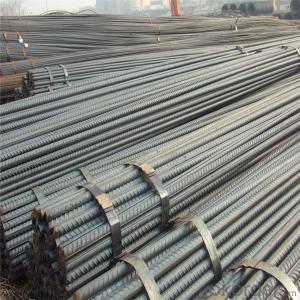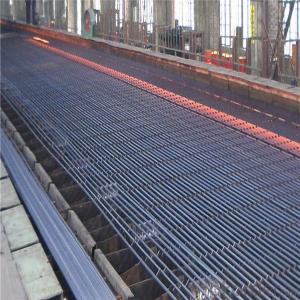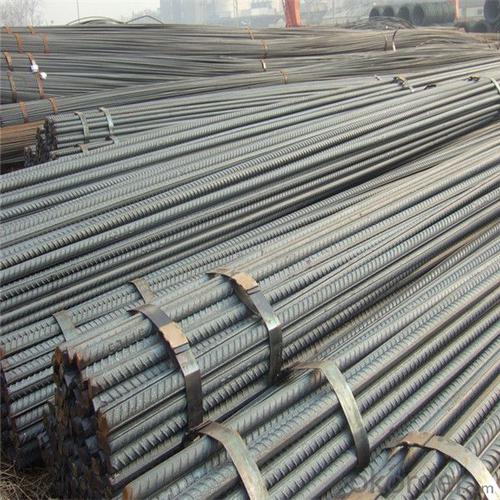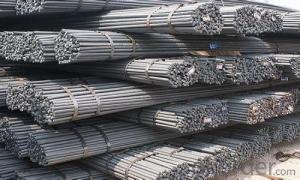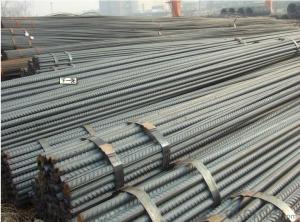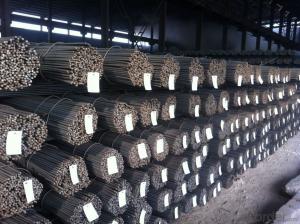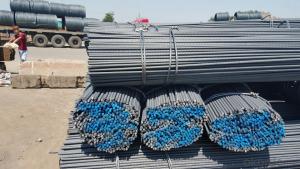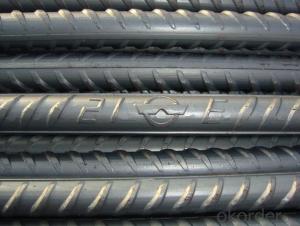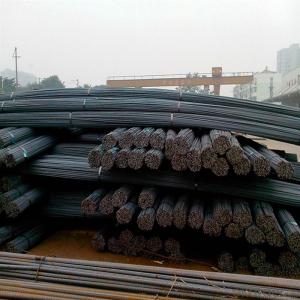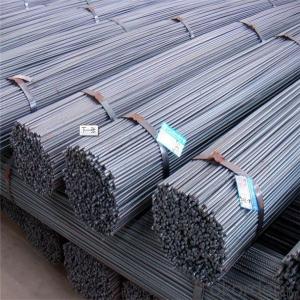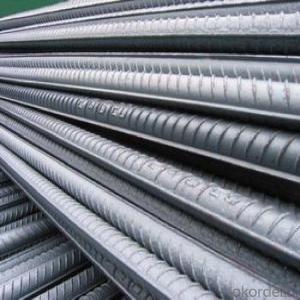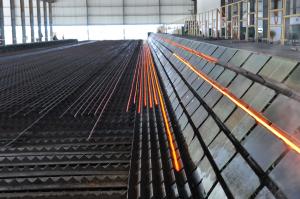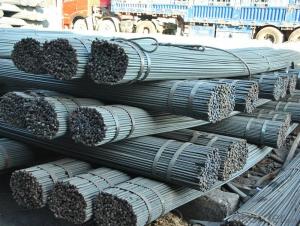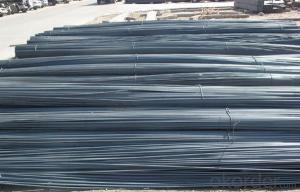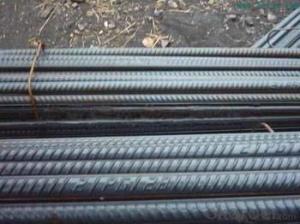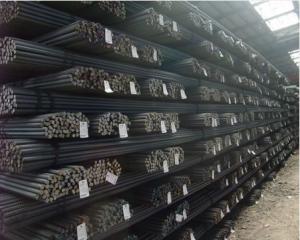Steel Rebars prices per ton for building construction
- Loading Port:
- Tianjin
- Payment Terms:
- TT OR LC
- Min Order Qty:
- 100 m.t.
- Supply Capability:
- 18000 m.t./month
OKorder Service Pledge
OKorder Financial Service
You Might Also Like
Specification
Common rebar is made of unfinished steel, making it susceptible to rusting. As rust takes up greater volume
than the iron or steel from which it was formed, it causes severe internal pressure on the surrounding concrete,
leading to cracking, spalling, and ultimately, structural failure. This is a particular problem where the concrete is
exposed to salt water, as in bridges built in areas where salt is applied to roadways in winter, or in marine applications.
Epoxy-coated rebar or stainless steel rebar may be employed in these situations at greater initial expense, but significantly
lower expense over the service life of the project. Fiber-reinforced polymer rebar is now also being used in high-corrosion environments
Our Advantage: High quality steel products from 1 class mills in China
Reasonable price
Professionalism of the products
On-time delivery
Complete documents and certificates
Sincere service to meet our clients' requirements
Product Description :
Chemical composition (%): | Steel | C | Si | Mn | P | S | Ceq | ||||
HRB335 |
0.25 |
0.80 |
1.60 |
0.045 |
0.045 | 0.52 | |||||
HRB400 | 0.54 | ||||||||||
HRB500 | 0.55 | ||||||||||
Mechanical properties | Steel | Rel/ MPa | Rm/ MPa | A/ % | Agt/ % | ||||||
≥ | |||||||||||
HRB335 | 335 | 455 | 17 |
7.5 | |||||||
HRB400 | 400 | 540 | 16 | ||||||||
HRB500 | 500 | 630 | 15 | ||||||||
Package: | Standard export packing or as customer's request | ||||||||||
Application: | Construction, building, bridge, road. ect | ||||||||||
Payment terms | 1).100% irrevocable L/C at sight. | ||||||||||
Delivery time | 15-30 days after receipt of L/C or deposit by T/T | ||||||||||
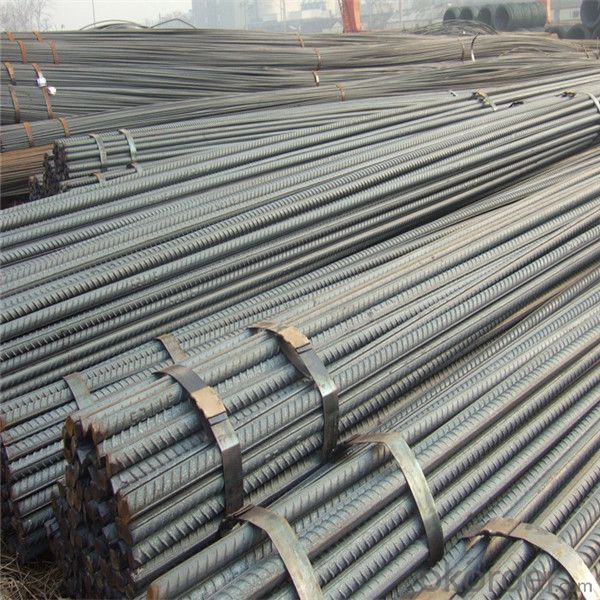
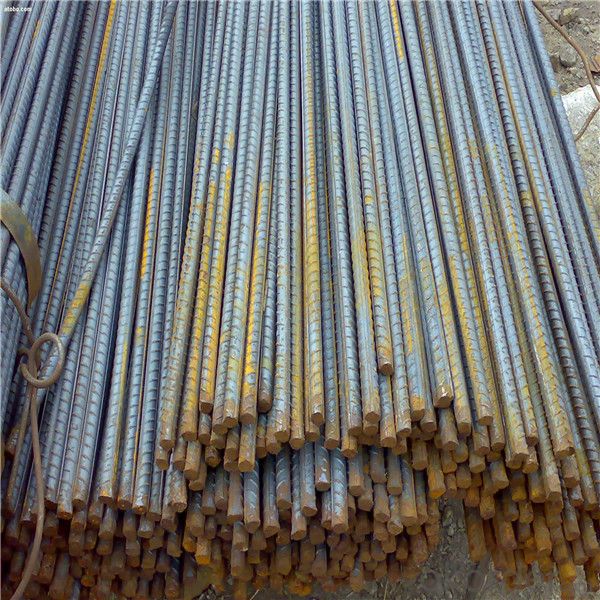
Packing:
In bundles, each bundle weight 3.5 tons. Load by container or by bulk verssel.
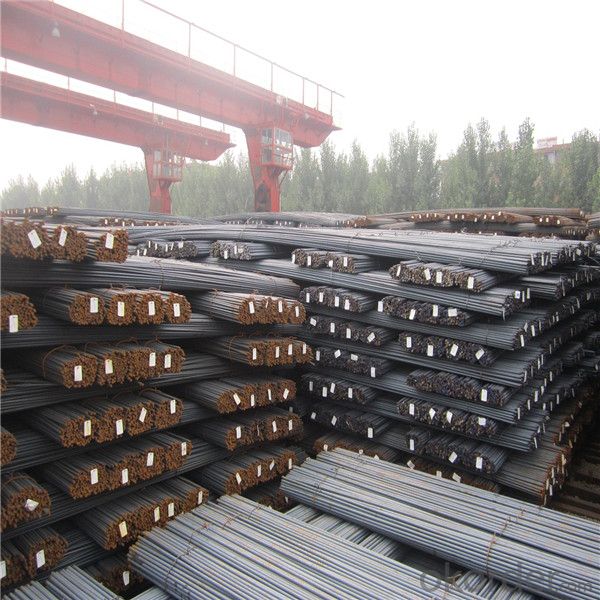

Our service
(1) We cooperate with famous factories with advanced equipment and well trained workers.
(2) We can provide factory price with trading company service.
(3) We continuously work on the improvement of our processes, guaranteeing consistently high standards
of quality to keep none compensation.
(4) We guarantee 24 hours response and 48 hours solution providing service.
(5) We accept small order quantity before formal cooperation.
(6) We deliver the agreed quality at the agreed time, reacting to changes in customer wishes in a flexible way.
(7) Due to our volume and selling power, we have excellent freight rates with shipping lines.
(8) We strive to always be fair and honest in our dealings with customers.
(9) We strive to work together with customers to achieve much more than we can achieve alone.
(10) Through our passion and commitment we aim to be a market leader in all our key markets. To maintain
our position as market leader we must continue to add value in all that we do.
FAQ:
1.Q: What's your MOQ(minimum order quantity)?
A: One full container, mixed acceptable .
2. Q: What's your packing methods?
A: Packed in bundle or bulk ..
3. Q: How can I buy CNBM products in my country?
A:Please send us an inquiry or email ,we will reply to you if there is distributor in your country
4. Q: Can we visit your factory?
A: Warmly welcome. Once we have your schedule, we will arrange the professional sales team to follow up your case.
5. Q: How long does it take to get the product if i place an order?
A:With the process of your requirements,we will pack and deliver in 3-7 days. If it is by sea shipment,it will take 15-45 days depending on different locations
- Q: What is the role of steel rebars in increasing the load-carrying capacity of a structure?
- The role of steel rebars in increasing the load-carrying capacity of a structure is to provide reinforcement and strength to the concrete. The rebars act as tension members, resisting the tensile forces that the concrete alone cannot handle effectively. By adding steel rebars to the structure, it becomes more resistant to bending, cracking, and failure under heavy loads. The rebars distribute the applied load across a larger area, enhancing the overall structural integrity and allowing for greater load-carrying capacity.
- Q: How do steel rebars improve the durability of concrete structures?
- Steel rebars improve the durability of concrete structures by providing added strength and reinforcement. They enhance the load-bearing capacity of the concrete, prevent cracking and deformation, and increase resistance to tension and bending forces. This reinforcement helps to minimize structural damage caused by factors like heavy loads, seismic activity, temperature fluctuations, and corrosion, ultimately increasing the lifespan and overall durability of the concrete structure.
- Q: Can steel rebars be used in water treatment plants?
- Yes, steel rebars can be used in water treatment plants. Steel rebars are commonly used in the construction of various structures, including water treatment plants, due to their high strength and durability. However, it is important to ensure that the steel rebars are properly coated or protected to prevent corrosion from the exposure to water and chemicals commonly found in water treatment plants.
- Q: What are the advantages of using ribbed steel rebars?
- Using ribbed steel rebars in construction projects offers several advantages. To begin with, the ribbed design of these rebars enhances the bonding with concrete. The presence of ribs increases the contact surface area between the rebar and the surrounding concrete, resulting in improved adhesion and prevention of slippage. This ultimately leads to a stronger bond, ensuring the structural integrity of the reinforced concrete. Secondly, ribbed steel rebars provide enhanced resistance against shear forces. The ribs act as anchor points within the concrete, evenly distributing the load and reducing the risk of failure due to shear stress. This makes ribbed rebars particularly suitable for applications that experience high shear forces, such as beams and columns. Additionally, the ribbed pattern of these rebars improves their ductility. Ductility refers to a material's ability to undergo deformation without breaking. The presence of ribs allows the steel rebar to stretch and bend without fracturing, making it more resistant to cracking or failure under stress. This is particularly crucial in earthquake-prone areas, where a structure's ability to absorb and dissipate energy is vital for its survival. Furthermore, ribbed steel rebars demonstrate excellent corrosion resistance. The ribs act as a barrier, effectively preventing moisture and corrosive agents from reaching the steel core. This significantly prolongs the lifespan of the rebar, reducing maintenance costs and ensuring the long-term durability of the reinforced concrete structure. Lastly, ribbed steel rebars are readily available and cost-effective. They come in various sizes and lengths, allowing for easy customization to meet different construction needs. Additionally, due to their popularity and widespread use, ribbed rebars are competitively priced, making them a cost-effective option for reinforcing concrete structures. In conclusion, the use of ribbed steel rebars offers multiple benefits, including enhanced bonding with concrete, improved resistance to shear forces, greater ductility, excellent corrosion resistance, and cost-effectiveness. These advantages make ribbed rebars an ideal choice for reinforcing concrete structures, guaranteeing strength, durability, and longevity in construction projects.
- Q: Can steel rebars be used in infrastructure projects?
- Yes, steel rebars can be used in infrastructure projects. They are commonly used in construction projects to reinforce concrete structures such as bridges, buildings, and highways. Steel rebars add strength and durability to the concrete, making it capable of withstanding heavy loads and harsh environmental conditions.
- Q: How are steel rebars manufactured and processed?
- Steel rebars are manufactured and processed through a series of steps. Firstly, the raw materials like steel billets or scrap metal are melted in a furnace to create molten steel. This molten steel is then poured into molds of desired shapes and sizes to form billets. These billets are further processed through a rolling mill, where they are heated and passed through a series of rollers to shape them into long, thin bars. The bars are then cooled, straightened, and cut into desired lengths. To enhance their strength, rebars are often subjected to heat treatment or alloying processes. Finally, they undergo surface treatment, such as corrosion-resistant coatings, to protect against rusting. The finished steel rebars are then ready for use in construction and reinforcing concrete structures.
- Q: What is the impact of steel rebars on the construction timeline?
- Steel rebars have a significant impact on the construction timeline as they play a crucial role in reinforcing concrete structures. By providing strength and durability, rebars ensure the structural integrity of buildings, bridges, and other infrastructure projects. However, their installation requires careful planning and coordination with other construction activities, which can sometimes cause delays in the overall timeline. Nevertheless, the use of rebars ultimately enhances the longevity and safety of the construction project, outweighing any temporary setbacks.
- Q: How do steel rebars affect the overall fire resistance of a structure?
- Steel rebars, which are commonly used in reinforced concrete structures, play a significant role in enhancing the overall fire resistance of a building. The presence of steel rebars provides structural stability and prevents the collapse of a building during a fire event. Steel is inherently fire-resistant and has a high melting point. When exposed to fire, the steel rebars heat up gradually, allowing them to maintain their integrity and structural strength. The slow heat transfer property of steel helps in preventing the spread of fire and slows down the rate at which the temperature rises. Moreover, the thermal conductivity of steel rebars is relatively lower compared to other construction materials, such as concrete. This property enables the steel rebars to act as a heat sink, absorbing and dissipating heat away from the vulnerable areas of the structure. By doing so, the rebars help in reducing the overall temperature within the building, thus extending the time before the critical temperature for structural failure is reached. Additionally, the presence of steel rebars in the concrete matrix creates a composite structure that benefits from the concrete's fire-resistant properties. Concrete has a high heat capacity and is known for its ability to resist fire and heat transfer. The combination of steel rebars and concrete creates a synergistic effect, enhancing the fire resistance of the structure. Furthermore, steel rebars contribute to the overall fire resistance by improving the load-bearing capacity of a building during a fire. The structural integrity provided by the steel rebars helps in maintaining the stability of the structure, preventing structural collapse, and facilitating safer evacuation. In conclusion, steel rebars have a positive impact on the overall fire resistance of a structure. They provide structural stability, slow down the rise in temperature, act as a heat sink, and enhance the load-bearing capacity. The combination of steel rebars and concrete creates a fire-resistant composite structure, thereby improving the safety and integrity of the building during a fire event.
- Q: What is the typical lead time for ordering steel rebars?
- The typical lead time for ordering steel rebars can vary depending on several factors. These factors include the quantity of rebars needed, the specific grade and size of rebars required, as well as the availability and location of the supplier. In general, if the rebars are readily available and in stock, the lead time can range from a few days to a couple of weeks. This is assuming that the supplier has the necessary inventory to fulfill the order and the logistics for transportation are straightforward. However, if the rebars need to be specially manufactured or if they are in high demand, the lead time can be longer. In such cases, it may take several weeks or even months to receive the rebars. This can be particularly true for large or custom orders that require special fabrication processes or if the supplier is experiencing production constraints. It is important to communicate with the supplier and provide them with all the necessary information about the specific requirements of the project to get a more accurate estimate of the lead time. Additionally, it is recommended to plan ahead and place the order well in advance to ensure the timely arrival of the rebars, especially for projects with strict deadlines.
- Q: How are steel rebars protected from rusting?
- Steel rebars are protected from rusting through a process called corrosion prevention, which typically involves applying a protective coating or using corrosion inhibitors. The most common method is to coat rebars with epoxy or zinc, creating a barrier between the steel and the surrounding environment. Additionally, rebars can be embedded in concrete, which acts as a protective layer, preventing water and oxygen from reaching the steel and causing rust.
Send your message to us
Steel Rebars prices per ton for building construction
- Loading Port:
- Tianjin
- Payment Terms:
- TT OR LC
- Min Order Qty:
- 100 m.t.
- Supply Capability:
- 18000 m.t./month
OKorder Service Pledge
OKorder Financial Service
Similar products
Hot products
Hot Searches
Related keywords
